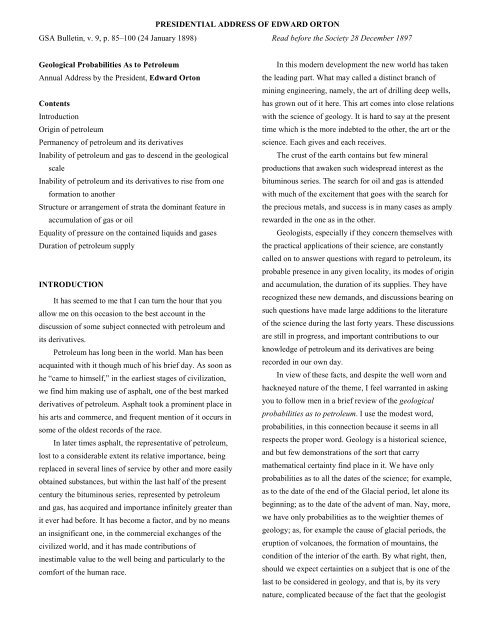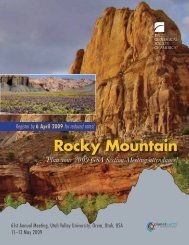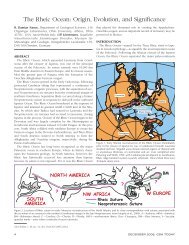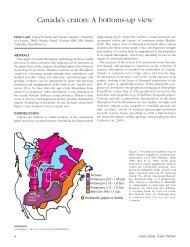Presidential Address - Geological Society of America
Presidential Address - Geological Society of America
Presidential Address - Geological Society of America
You also want an ePaper? Increase the reach of your titles
YUMPU automatically turns print PDFs into web optimized ePapers that Google loves.
PRESIDENTIAL ADDRESS OF EDWARD ORTON<br />
GSA Bulletin, v. 9, p. 85–100 (24 January 1898) Read before the <strong>Society</strong> 28 December 1897<br />
<strong>Geological</strong> Probabilities As to Petroleum<br />
Annual <strong>Address</strong> by the President, Edward Orton<br />
Contents<br />
Introduction<br />
Origin <strong>of</strong> petroleum<br />
Permanency <strong>of</strong> petroleum and its derivatives<br />
Inability <strong>of</strong> petroleum and gas to descend in the geological<br />
scale<br />
Inability <strong>of</strong> petroleum and its derivatives to rise from one<br />
formation to another<br />
Structure or arrangement <strong>of</strong> strata the dominant feature in<br />
accumulation <strong>of</strong> gas or oil<br />
Equality <strong>of</strong> pressure on the contained liquids and gases<br />
Duration <strong>of</strong> petroleum supply<br />
INTRODUCTION<br />
It has seemed to me that I can turn the hour that you<br />
allow me on this occasion to the best account in the<br />
discussion <strong>of</strong> some subject connected with petroleum and<br />
its derivatives.<br />
Petroleum has long been in the world. Man has been<br />
acquainted with it though much <strong>of</strong> his brief day. As soon as<br />
he “came to himself,” in the earliest stages <strong>of</strong> civilization,<br />
we find him making use <strong>of</strong> asphalt, one <strong>of</strong> the best marked<br />
derivatives <strong>of</strong> petroleum. Asphalt took a prominent place in<br />
his arts and commerce, and frequent mention <strong>of</strong> it occurs in<br />
some <strong>of</strong> the oldest records <strong>of</strong> the race.<br />
In later times asphalt, the representative <strong>of</strong> petroleum,<br />
lost to a considerable extent its relative importance, being<br />
replaced in several lines <strong>of</strong> service by other and more easily<br />
obtained substances, but within the last half <strong>of</strong> the present<br />
century the bituminous series, represented by petroleum<br />
and gas, has acquired and importance infinitely greater than<br />
it ever had before. It has become a factor, and by no means<br />
an insignificant one, in the commercial exchanges <strong>of</strong> the<br />
civilized world, and it has made contributions <strong>of</strong><br />
inestimable value to the well being and particularly to the<br />
comfort <strong>of</strong> the human race.<br />
In this modern development the new world has taken<br />
the leading part. What may called a distinct branch <strong>of</strong><br />
mining engineering, namely, the art <strong>of</strong> drilling deep wells,<br />
has grown out <strong>of</strong> it here. This art comes into close relations<br />
with the science <strong>of</strong> geology. It is hard to say at the present<br />
time which is the more indebted to the other, the art or the<br />
science. Each gives and each receives.<br />
The crust <strong>of</strong> the earth contains but few mineral<br />
productions that awaken such widespread interest as the<br />
bituminous series. The search for oil and gas is attended<br />
with much <strong>of</strong> the excitement that goes with the search for<br />
the precious metals, and success is in many cases as amply<br />
rewarded in the one as in the other.<br />
Geologists, especially if they concern themselves with<br />
the practical applications <strong>of</strong> their science, are constantly<br />
called on to answer questions with regard to petroleum, its<br />
probable presence in any given locality, its modes <strong>of</strong> origin<br />
and accumulation, the duration <strong>of</strong> its supplies. They have<br />
recognized these new demands, and discussions bearing on<br />
such questions have made large additions to the literature<br />
<strong>of</strong> the science during the last forty years. These discussions<br />
are still in progress, and important contributions to our<br />
knowledge <strong>of</strong> petroleum and its derivatives are being<br />
recorded in our own day.<br />
In view <strong>of</strong> these facts, and despite the well worn and<br />
hackneyed nature <strong>of</strong> the theme, I feel warranted in asking<br />
you to follow men in a brief review <strong>of</strong> the geological<br />
probabilities as to petroleum. I use the modest word,<br />
probabilities, in this connection because it seems in all<br />
respects the proper word. Geology is a historical science,<br />
and but few demonstrations <strong>of</strong> the sort that carry<br />
mathematical certainty find place in it. We have only<br />
probabilities as to all the dates <strong>of</strong> the science; for example,<br />
as to the date <strong>of</strong> the end <strong>of</strong> the Glacial period, let alone its<br />
beginning; as to the date <strong>of</strong> the advent <strong>of</strong> man. Nay, more,<br />
we have only probabilities as to the weightier themes <strong>of</strong><br />
geology; as, for example the cause <strong>of</strong> glacial periods, the<br />
eruption <strong>of</strong> volcanoes, the formation <strong>of</strong> mountains, the<br />
condition <strong>of</strong> the interior <strong>of</strong> the earth. By what right, then,<br />
should we expect certainties on a subject that is one <strong>of</strong> the<br />
last to be considered in geology, and that is, by its very<br />
nature, complicated because <strong>of</strong> the fact that the geologist
GSA Bulletin, v. 10, p. 85–100 (24 January 1898) Read before the <strong>Society</strong> 28 December 1897<br />
must depend on the chemist for the ultimate decision <strong>of</strong><br />
many vital points in the investigation? But I must remind<br />
you that there are probabilities and probabilities in geology.<br />
In other words, geological probabilities are <strong>of</strong> different<br />
orders. Some <strong>of</strong> them are so strongly supported that they<br />
count for certainties with many minds. In what respect they<br />
could be strengthened by subsequent discoveries it is hard<br />
to see; but we may still style our conclusions, even on such<br />
subjects, probable.<br />
ORIGIN OF PETROLEUM<br />
Among the geological probabilities as to petroleum, I<br />
mention first those which bear upon its origin. Geologists<br />
believe that petroleum is in all instances derived from<br />
organic matter—that is, they believe that petroleum falls<br />
into line with every other combustible body that we know<br />
<strong>of</strong> or beneath the crust <strong>of</strong> the earth. Everything that burns<br />
has borrowed its power to burn from the sun. It burns<br />
because it holds some <strong>of</strong> the sun’s heat and light<br />
imprisoned in the organic substances formed by these<br />
agents. Burning is the rapid restoration <strong>of</strong> this organic<br />
matter to the simpler state from which it originally came.<br />
To what other source can petroleum be referred? We<br />
are all familiar with the great chemical hypotheses that<br />
have been before the world the last 30 or 40 years. The<br />
names <strong>of</strong> their authors are a sufficient guaranty <strong>of</strong> the<br />
soundness <strong>of</strong> the chemical actions and reactions invoked—<br />
that is, <strong>of</strong> the chemical possibilities concerned. To one <strong>of</strong><br />
these theories, which has somewhat more to commend it,<br />
or, rather, somewhat less to condemn it, than the other<br />
theories <strong>of</strong> the same class, the great name <strong>of</strong> Mendelejeff,<br />
the discoverer <strong>of</strong> the periodic law, is attached. In what light<br />
the postulates <strong>of</strong> this theory are regarded by chemists I am<br />
not able to say. These postulates, in substance, involve<br />
masses <strong>of</strong> white-hot iron, buried miles below the surface in<br />
the depths <strong>of</strong> the original crust, but still reached by water<br />
percolating from the surface and charged with carbon<br />
dioxide, the whole giving rise to a somewhat complicated<br />
series <strong>of</strong> chemical reactions out <strong>of</strong> which petroleum at last<br />
emerges.<br />
I repeat, I do not know how this theory appears to<br />
chemists, but to geologists it sounds like an echo from the<br />
eighteenth century. It goes back to Werner’s day and takes<br />
its place among the “cloud-capped towers and gorgeous<br />
palaces” <strong>of</strong> the speculations <strong>of</strong> the time when cataclysmic<br />
geology was in undisturbed possession <strong>of</strong> the field.<br />
The law <strong>of</strong> parsimony <strong>of</strong> force seems applicable to this<br />
case. It is not necessary to go so far as these chemical<br />
theories require for a source <strong>of</strong> petroleum, because there is<br />
always an organic source nearer at hand. We can roughly<br />
divide the rocks <strong>of</strong> the earth’s crust into two great series;<br />
those in which organic remains are more or less abundant<br />
and those in which no traces <strong>of</strong> life are found, either<br />
because life had not been introduced at the time <strong>of</strong> their<br />
formation or because metamorphic changes have<br />
supervened since their origin, by reason <strong>of</strong> which all such<br />
traces, if ever present, have disappeared.<br />
In the last named division neither petroleum nor any <strong>of</strong><br />
its derivatives is ever found; all its occurrences are<br />
confined to the fossiliferous division. While the Archean<br />
rocks do not cover surface areas as large as the vast series<br />
formed in the ages <strong>of</strong> life, they are by no means<br />
insignificant in extent. Two million square miles in one<br />
continuous body, more than one-fourth <strong>of</strong> North <strong>America</strong>,<br />
are referred to this series in the Canadian protaxis alone. In<br />
the other continental masses a like distribution is<br />
recognized.<br />
Now, if the real centers at which petroleum originates<br />
are to be found below the Archean, in the primeval crust,<br />
according to Mendelejeff’s theory, the carbonated waters <strong>of</strong><br />
the surface, essential to the process, would certainly have a<br />
shorter course in reaching these centers when descending<br />
through the uncovered Archean than by going down<br />
through thousands <strong>of</strong> feet <strong>of</strong> the stratified and fossiliferous<br />
rocks overlying them. It is hard, therefore, to see why, the<br />
whole world over, petroleum is entirely wanting in the<br />
Archean and exclusively confined to the stratified rocks.<br />
There is not an oil field in the world in rocks <strong>of</strong> Archean<br />
time. To this it may be replied that the absence <strong>of</strong><br />
petroleum from Archean rocks may be due to the fact that<br />
porous rocks suitable for storage are not found in this<br />
series; but according to Mendelejeff the process <strong>of</strong><br />
petroleum manufacture is in constant operation, and<br />
certainly any large stock produced within the last 5,000 or<br />
10,000 years, not to speak <strong>of</strong> the last 50 or 100 years,<br />
would have left some clue or token upon the surface.<br />
Page 2
GSA Bulletin, v. 10, p. 85–100 (24 January 1898) Read before the <strong>Society</strong> 28 December 1897<br />
Further, there seems to have been a notable increase <strong>of</strong><br />
the bituminous series as the geological ages have advanced.<br />
The maximum <strong>of</strong> their production was apparently reached<br />
in the great division that immediately precedes the present<br />
order, namely, in Tertiary time; but this increase in the<br />
petroliferous series has gone forward contemporaneously<br />
with the decrease in the internal heat <strong>of</strong> the earth. There has<br />
been, however, a gain in the total amount <strong>of</strong> life which the<br />
rocks contain, and this roughly corresponds with the<br />
increase in the total accumulation <strong>of</strong> bituminous products<br />
above referred to.<br />
That the organic world is an adequate source <strong>of</strong><br />
petroleum has been abundantly demonstrated within the<br />
last few years. The demonstration was begun by Warren<br />
and Storer in the distillation <strong>of</strong> a lime soap made from<br />
menhaden oil. In this operation various compounds<br />
belonging to the bituminous series were definitely<br />
developed. This work was made known to the world about<br />
1867–’68.<br />
Investigation was subsequently carried still further in<br />
this line and to still more striking results by Dr Carl Engler,<br />
<strong>of</strong> Carlsruhe, Germany, who has obtained from fish oil, and<br />
afterward from lard oil, almost the entire bituminous series<br />
to which petroleum belongs. In the list <strong>of</strong> the products<br />
which he thus obtained from the sources named are to be<br />
found illuminating oil, lubricating oil, benzene, and<br />
paraffine. Engler’s results were published in 1888.<br />
The animal world has thus been definitely proved to<br />
be, at least in its higher divisions, a possible source <strong>of</strong><br />
petroleum and its various derivatives. And now comes<br />
Dr S.P. Sadtler, <strong>of</strong> Philadelphia, who has extended a similar<br />
line <strong>of</strong> investigation to the vegetable world as well. In an<br />
important paper read before the <strong>America</strong>n Philosophical<br />
<strong>Society</strong> February 5 <strong>of</strong> the present year he made known the<br />
results <strong>of</strong> the work which he had recently carried on and<br />
which he still continues in the distillation <strong>of</strong> linseed oil<br />
under pressure. He obtained by this process hydrocarbon<br />
oils analogous to natural mineral oil or petroleum, and,<br />
among other products, he produced a good specimen <strong>of</strong><br />
scale paraffine. It is altogether probable that oils derived<br />
from other vegetable seeds would show the same<br />
characteristics. The vegetable kingdom is thus shown to be<br />
on the same plane with the animal kingdom as a possible<br />
source <strong>of</strong> the bituminous series.<br />
Daubree, perhaps the most ingenious and successful<br />
experimental geologist <strong>of</strong> the century, advanced the same<br />
claim at a still earlier day. He declared that by the action <strong>of</strong><br />
superheated steam upon wood he had obtained both liquid<br />
and gaseous products closely allied to petroleum. In his<br />
view the concurrent action <strong>of</strong> water, heat, and pressure on<br />
vegetable matter furnished an adequate account <strong>of</strong> the<br />
natural production. Engler’s discovery is worthily<br />
supplemental and balanced by Sadtler’s. From the latter we<br />
see how hasty and unwarranted the conclusion adopted by<br />
some, that the origin <strong>of</strong> petroleum always and everywhere<br />
is to be ascribed to the products <strong>of</strong> the decay <strong>of</strong> fishes.<br />
Closely related to this latter claim are the facts<br />
pertaining to the Trenton limestone oil field <strong>of</strong> Ohio and<br />
Indiana. This is unmistakably one <strong>of</strong> the most important<br />
reservoirs <strong>of</strong> petroleum that was ever discovered; but it<br />
originated long antecedent to the appearance <strong>of</strong> fishes in<br />
the geological scale. In placing it before the introduction <strong>of</strong><br />
fishes I do not forget the recent discovery by Mr Charles D.<br />
Walcott, director <strong>of</strong> the <strong>Geological</strong> Survey <strong>of</strong> the United<br />
States, <strong>of</strong> fish remains in the lower Trenton <strong>of</strong> Colorado.<br />
Geologists have not yet had time to assimilate this<br />
remarkable discovery and to give it its due place in the<br />
history <strong>of</strong> the life <strong>of</strong> the world; but certainly these<br />
Ordovician fishes <strong>of</strong> Colorado might as well not have been,<br />
so far as the burial life <strong>of</strong> the world at large is concerned.<br />
Not a hint <strong>of</strong> the existence <strong>of</strong> one <strong>of</strong> them has been found in<br />
the well worked formations <strong>of</strong> Ordovician time in any other<br />
part <strong>of</strong> the globe. Vast periods <strong>of</strong> time elapsed after this<br />
date, periods measured by the deposition <strong>of</strong> many<br />
thousands <strong>of</strong> feet <strong>of</strong> the various types <strong>of</strong> sedimentary rocks,<br />
before fishes appeared elsewhere in the world. The<br />
petroleum <strong>of</strong> the Trenton limestone owes nothing whatever<br />
to the vertebrate type, so far as its sources are concerned.<br />
While geologists find such a warrant as I have<br />
indicated and much besides for believing in the organic<br />
origin <strong>of</strong> petroleum, it cannot be claimed that they hold<br />
concordant views as to the manner in which the conversion<br />
<strong>of</strong> organic tissue into mineral oil has been accomplished.<br />
They recognize the process as essentially chemical in its<br />
Page 3
GSA Bulletin, v. 10, p. 85–100 (24 January 1898) Read before the <strong>Society</strong> 28 December 1897<br />
nature and are prepared to welcome all pertinent facts and<br />
discoveries from students <strong>of</strong> this branch <strong>of</strong> knowledge.<br />
It is easy to see how the bituminous series may result<br />
from the destructive distillation <strong>of</strong> either vegetable or<br />
animal substances enclosed in the rocks, and wherever<br />
conditions can be shown that provide for such distillation<br />
we are not obliged to go further in our search. Destructive<br />
distillation can take effect on organic matter that has<br />
attained a permanent or stable condition in the rocks, like<br />
the carbonaceous matter <strong>of</strong> black shales or coal; but it<br />
seems improbable on many and obvious grounds that this<br />
can be the normal and orderly process <strong>of</strong> petroleum<br />
production.<br />
This production <strong>of</strong> petroleum must be in active<br />
operation in the world today; at least it seems highly<br />
improbable that a process coeval with the kingdoms <strong>of</strong> life,<br />
growing with their growth and strengthening with their<br />
strength, a process that was certainly in its highest activity<br />
throughout Tertiary time, leaving a most important record<br />
in the rocks <strong>of</strong> that age, should suddenly and completely<br />
disappear from the scene upon which it had wrought so<br />
long and upon which all other conditions appear to be<br />
substantially unchanged.<br />
What geologists would be glad to find in nature as<br />
matching to and harmonizing with the facts with which<br />
they are obliged to reckon would be a process in which the<br />
products <strong>of</strong> the organic world are transformed into mineral<br />
oil at ordinary temperatures and with complete<br />
consumption <strong>of</strong> the substances acted upon, so that no<br />
carbon residue would be left behind. They would also<br />
expect the transformation to be accomplished while the<br />
organic matter still retained essentially its original<br />
character.<br />
The demands <strong>of</strong> the chemists are much the same. For<br />
the origination <strong>of</strong> the petroleum <strong>of</strong> Pennsylvania, one <strong>of</strong><br />
them, namely, Pr<strong>of</strong>essor E.J. Mills, <strong>of</strong> Glasgow, Scotland,<br />
requires “long continued application <strong>of</strong> a gentle heat to<br />
some derived form <strong>of</strong> cellulose.”<br />
Whether such a process as the geologists are looking<br />
for is a fact <strong>of</strong> nature and susceptible <strong>of</strong> satisfactory pro<strong>of</strong><br />
or whether the demand for it is mistaken and irrational<br />
remains to be determined. Once and again support seems to<br />
have come to such a view from certain lines <strong>of</strong> reported<br />
facts. The testimony <strong>of</strong> G.P. Wall in 1860 to the effect that<br />
the production <strong>of</strong> petroleum could be seen going forward<br />
on the island <strong>of</strong> Trinidad, manifestly connected with the<br />
decomposition <strong>of</strong> vegetable tissue, has not been<br />
corroborated by later observers. Wall’s testimony was in<br />
itself impressive and it was used effectively by Dr T.S.<br />
Hunt. If it had been or could be thoroughly substantiated, it<br />
would go far toward settling the question at issue.<br />
Considerable weight has also been attached to the<br />
recent observations reported by Dr Oscar Fraas, <strong>of</strong><br />
Stuttgart, on the occurrence <strong>of</strong> petroleum in certain coral<br />
reefs <strong>of</strong> the Red sea. Dr Fraas confidently refers the<br />
petroleum to the decomposition <strong>of</strong> the organic matter <strong>of</strong> the<br />
reef. This claim also, if fully sustained, would solve the<br />
problem as to the mode <strong>of</strong> origin <strong>of</strong> petroleum; but<br />
unfortunately the interpretation <strong>of</strong> the facts is not beyond<br />
question. Other explanations <strong>of</strong> the presence <strong>of</strong> the<br />
observed petroleum can be <strong>of</strong>fered, which have at least a<br />
show <strong>of</strong> probability. If, however, further examination<br />
should confirm the claim <strong>of</strong> Fraas that petroleum is now<br />
forming in these reefs at the normal temperature <strong>of</strong> the sea<br />
and out <strong>of</strong> the organic remains <strong>of</strong> dead corals, the long<br />
controversy would be closed.<br />
The occurrence <strong>of</strong> petroleum or its derivatives in fossil<br />
corrals and shells has long been noted. The facts have been<br />
used by some as decisive pro<strong>of</strong> <strong>of</strong> the conversion into oil <strong>of</strong><br />
the organic matter represented by the fossils; but to this it is<br />
objected that the petroleum found greatly exceeds in<br />
amount what the organic matter in question could supply.<br />
The objection seems to me well taken.<br />
Its occurrence in peat bogs, as recorded by Binney, is<br />
not pro<strong>of</strong> conclusive that it originated there.<br />
Any theory <strong>of</strong> petroleum production to be acceptable<br />
to geologists must provide for the use <strong>of</strong> the organic<br />
substances elaborated by the lower divisions <strong>of</strong> animal and<br />
vegetable kingdoms as well as by the higher. To limit the<br />
process to the fatty acids derived from the decomposition<br />
<strong>of</strong> vertebrates or to the oils contained in the seeds <strong>of</strong> the<br />
highest groups <strong>of</strong> plants would be ludicrously inadequate.<br />
As in the doctrine <strong>of</strong> orthodoxy, the geological test must be,<br />
Quod semper, ubicunque, ab omnibus. The great stocks <strong>of</strong><br />
petroleum on which the world depends are practically<br />
independent <strong>of</strong> both these higher sources. As we have seen,<br />
Page 4
GSA Bulletin, v. 10, p. 85–100 (24 January 1898) Read before the <strong>Society</strong> 28 December 1897<br />
some <strong>of</strong> the oil fields antedate these divisions, not by<br />
millenniums alone, but by eons.<br />
We must not forget that the chemical actions and<br />
reactions which we set in motion laboriously and with great<br />
expenditure <strong>of</strong> force in our laboratories, in the great<br />
laboratory <strong>of</strong> nature appear to be the simplest and easiest<br />
possible character. Witness, for example the decomposition<br />
<strong>of</strong> carbonic acid in the cells <strong>of</strong> every growing plant.<br />
INABILITY OF PETROLEUM AND GAS TO<br />
DESCEND IN THE GEOLOGICAL SCALE<br />
It is probable that neither petroleum nor its derivatives<br />
ever descend in the geological scale. Petroleum is<br />
specifically lighter than the liquids associated with it in the<br />
rocks. These liquids are generally saline waters, and their<br />
gravity is greater than that <strong>of</strong> fresh water, sometimes by as<br />
much as one-tenth. Oil consequently rises in the rocks by<br />
means <strong>of</strong> this well-nigh universally distributed water just as<br />
far as the possibility <strong>of</strong> movement is allowed to it. Natural<br />
gas, the most common derivative <strong>of</strong> petroleum, in like<br />
manner rises as far as it finds any open was, but no<br />
agencies are known by which either petroleum or gas can<br />
be carried to lower horizons than those in which they<br />
originate.<br />
You will not fail to note an important consequence that<br />
follows from this principle, namely, that petroleum gas is<br />
as old as the lowest stratum in which it is found.<br />
In the town <strong>of</strong> Parish, Oswego county, New York, a<br />
well was drilled two years ago to a depth <strong>of</strong> 2,160 feet. It<br />
was begun in the Medina sandstone. The drill stopped in<br />
red granite seven feet below the surface <strong>of</strong> this last-named<br />
formation. The granite was <strong>of</strong> the same character that is<br />
found in the nearest outcrops <strong>of</strong> Archean rocks—that is, on<br />
the western boundary <strong>of</strong> the Adirondack region. The series<br />
through which the drill was descended was normal in every<br />
respect. There was found, successively, the Medina<br />
sandstones, red and white; the Medina shale, in<br />
characteristic showing; the Oswego sandstone and Pulaski<br />
shale <strong>of</strong> the Hudson River group; the Utica shale and a<br />
series <strong>of</strong> Ordovician limestones, 600 feet <strong>of</strong> which are<br />
referred to the Trenton. Below the Trenton, at a depth <strong>of</strong><br />
about 100 feet and in accordance with the usual<br />
stratigraphical sequence <strong>of</strong> the district, a stratum <strong>of</strong> white<br />
Potsdam sandstone was reached. It was 47 feet thick, and a<br />
gas vein <strong>of</strong> fair strength and volume was found in it. The<br />
gas attained a rock pressure <strong>of</strong> 340 pounds when shut in.<br />
Immediately below the Potsdam a stratum <strong>of</strong> dark<br />
Cambrian limestone was found. It contains rather obscure<br />
traces <strong>of</strong> animal life, apparently referable to Cambrian<br />
trilobites, and below the limestone, at a total depth <strong>of</strong> about<br />
2,150 feet, the granite was reached, as above described.<br />
The discovery <strong>of</strong> gas in the Potsdam sandstone aroused<br />
considerable interest among the parties in charge, and it<br />
was deemed best to try the effects <strong>of</strong> a torpedo on well. A<br />
light shot was lowered, designed for the horizon in which<br />
the gas was found; but by a slight miscalculation the<br />
explosion took place somewhat lower than was planned,<br />
and, as it proved, in the granite formation in part. A quart<br />
or two <strong>of</strong> granite fragments, some <strong>of</strong> them an inch in<br />
diameter, were brought up by the sandpump. The gas<br />
supply was increased somewhat by the torpedo, but nothing<br />
came from the well in the way <strong>of</strong> practical results. But there<br />
are certain facts and suggestions on a scientific side that are<br />
not without interest.<br />
The gas struck in this well is <strong>of</strong> Cambrian age. It is<br />
thus practically coeval with Linguelella, Dicellocephalus,<br />
and their allies. It is probably the equivalent but altered<br />
form <strong>of</strong> a small stock <strong>of</strong> petroleum derived presumably<br />
from the decomposition <strong>of</strong> Cambrian trilobites and<br />
brachiopods. The Cambrian gas belongs, we may be sure,<br />
where it is found. It is in its original home. There is no<br />
source from which it could be derived in the granite<br />
foundations that underlie, and it cannot have come from<br />
above. Let alone the constant and insuperable opposition <strong>of</strong><br />
gravitation to its descent through heavier liquids, the shale<br />
ro<strong>of</strong> <strong>of</strong> the Potsdam, which proves itself able to withstand a<br />
gas pressure <strong>of</strong> at least 340 pounds to the square inch,<br />
would have had to be penetrated if any supply had come<br />
from above.<br />
No; we have reached at last a point <strong>of</strong> beginning. There<br />
are no mysterious depths below on which we may draw in<br />
imagination for the material from which the petroleum<br />
represented by the gas here found, could be generated or<br />
for the heat that should effect the dry distillation <strong>of</strong> organic<br />
matter or for a hiding place for the carbon residue that must<br />
necessarily attend the process <strong>of</strong> destructive distillation. If<br />
Page 5
GSA Bulletin, v. 10, p. 85–100 (24 January 1898) Read before the <strong>Society</strong> 28 December 1897<br />
the dark color <strong>of</strong> the limestone is referred to the carbon<br />
residue, then such residues are found without end in all<br />
dark colored rocks.<br />
The stratum that here underlies the Potsdam sandstone<br />
is, as I have already said, a dark limestone, never more than<br />
40 feet in thickness and sometimes much less. Fragments <strong>of</strong><br />
the limestone 2 to 3 inches in length have occasionally been<br />
brought up from the wells, and in them we are able to study<br />
the character <strong>of</strong> the stratum. Like most deep limestones, it<br />
is compact and hard to drill. Because <strong>of</strong> this character, it<br />
has sometimes been named “black granite” in the well<br />
records; but there is not a trace or hint <strong>of</strong> metamorphic<br />
action about it. The contrast between the dark limestone<br />
and the red granite that underlies it is always immediately<br />
apparent to the driller. Innumerable but unidentifiable<br />
fragments <strong>of</strong> trilobite crusts make a prominent part <strong>of</strong> its<br />
substance. There seems to be very little material in it from<br />
which petroleum production could be maintained even by<br />
dry or destructive distillation.<br />
A dozen or more other wells have been drilled to the<br />
granite in the same region. All <strong>of</strong> them agree in their<br />
records. The two principal strata below the Trenton<br />
limestone are the Potsdam sandstone and the dark<br />
limestone, already described. The drillings brought from<br />
these horizons seem normal in every respect. Certainly<br />
there is no hint <strong>of</strong> any transformation by heat. “The smell<br />
<strong>of</strong> fire has not passed on them.” There is no carbon residue.<br />
The bituminous products found in them cannot therefore<br />
owe their origin to the usual form <strong>of</strong> destructive distillation.<br />
In following the discussion to this point, I come upon a<br />
theory that is sometimes met in the speculations <strong>of</strong> our day.<br />
It is to the effect that the great stocks <strong>of</strong> our oil fields—the<br />
oil fields <strong>of</strong> Pennsylvania, for example, distributed through<br />
a half dozen distinct horizons and through thousands <strong>of</strong> feet<br />
<strong>of</strong> vertical range—have all been derived from a common<br />
and deeply buried source; and, further, that both gas and oil<br />
have been purified in the process <strong>of</strong> ascent, the highest oil<br />
in the vertical series being the highest in chemical character<br />
as well.<br />
INABILITY OF PETROLEUM AND ITS<br />
DERIVATIVES TO RISE FROM ONE FORMATION<br />
TO ANOTHER<br />
I remark, therefore, in the fourth place, it is probable<br />
that petroleum and its derivatives are unable to rise in the<br />
geological scale from one porous formation to another. In<br />
other words, the principal deposits are hermetically sealed<br />
in the strata that contain them.<br />
I have already recognized the obvious fact that in a<br />
homogeneous and permeable formation there must always<br />
be the movement that gravity would cause in separating at<br />
different levels the oil, gas, and salt water contained in it.<br />
Such differentiating movement would <strong>of</strong> course go on<br />
when oil rocks are, by the warping <strong>of</strong> the crust, bent into<br />
low arches or monoclines. Oil rocks also rise to day in<br />
natural outcrops, and more or less movement <strong>of</strong> their<br />
contents is rendered possible and necessary in this way.<br />
There are also numberless fractures and faults beside, by<br />
which the contents <strong>of</strong> porous rocks can reach the surface.<br />
The “surface indications” <strong>of</strong> gas and oil, <strong>of</strong> which we hear<br />
so much, are principally due to these last-named facts.<br />
Characteristic examples <strong>of</strong> such fractures are found in<br />
Pennsylvania and Ohio fields; but sound observation seems<br />
to show that every deeply buried oil and gas rock is, in a<br />
normal state, hermetically sealed, and no communication in<br />
the vertical scale is possible between the porous rocks <strong>of</strong> a<br />
single section.<br />
For the establishment <strong>of</strong> this probability I must again<br />
draw upon the experience that has been accumulated in<br />
New York within the last few years. In Oswego and<br />
Onondaga counties, <strong>of</strong> this state, natural gas has been found<br />
in large volume in wells drilled into the Trenton limestone.<br />
Near Baldwinsville, Onondaga county, the Monroe well<br />
was drilled in the late autumn <strong>of</strong> 1896. It reached the<br />
surface <strong>of</strong> the Trenton limestone at 2,250 feet. At a depth <strong>of</strong><br />
120 feet in this stratum a vigorous gas vein was struck, the<br />
rock pressure <strong>of</strong> which reached the amazing figure <strong>of</strong> 1,525<br />
pounds to the square inch. I read for myself in August last a<br />
pressure <strong>of</strong> 1,370 pounds to the square inch on the gauge <strong>of</strong><br />
this well after its gas supply had been drawn steadily for up<br />
to four months.<br />
A rock pressure <strong>of</strong> 1,500 pounds to the square inch<br />
stands for, nay, demands, a hermetic seal. Think <strong>of</strong> it a<br />
Page 6
GSA Bulletin, v. 10, p. 85–100 (24 January 1898) Read before the <strong>Society</strong> 28 December 1897<br />
moment! If there had been a drill to go down 150 years<br />
ago, when northern New York was still covered with the<br />
primeval forest, the same pressure would have been found<br />
here; if when Columbus discovered the New World, 400<br />
years ago, it would have been the same; the same when the<br />
Christian era was begun, 1,900 years ago, by the birth <strong>of</strong><br />
the babe in Bethlehem; the same when Romulus and<br />
Remus were herding their flocks on the seven hills <strong>of</strong><br />
Rome; the same when the Pharaohs were quarrying the<br />
nummulite limestones out <strong>of</strong> which the pyramids were<br />
built. Can even the semblance <strong>of</strong> a reason be given why the<br />
pressure should have been any less when the nummulites<br />
were growing in the Tertiary seas?<br />
All the events and epochs which I have named are “but<br />
as yesterday when it is past and as a watch in the night”<br />
compared with the ages that have gone by since the<br />
petroleum from which the gas was derived was store in the<br />
Trenton limestone <strong>of</strong> northern New York.<br />
Now, if the rock cover <strong>of</strong> a gas field is to any extent<br />
permeable, it would certainly seem that a pressure <strong>of</strong> over<br />
200,000 pounds to the square foot, for this is what 1,500<br />
pounds to the square inch means, ought to be able to find<br />
the open way. Any rock which withstands such a pressure<br />
for thousands and millions <strong>of</strong> years might as well be<br />
labeled “no thoroughfare.” Similar reasoning will apply to<br />
pressures <strong>of</strong> one-half, one-fourth, or even one-tenth <strong>of</strong> the<br />
1,500 pounds which was registered in the Monroe well.<br />
If it had been possible for this imprisoned gas to<br />
escape at any measurable rate with a pressure <strong>of</strong> 1,500<br />
pounds to the square inch, then the present figures must<br />
indicate a remainder <strong>of</strong> pressure after thousands and<br />
millions <strong>of</strong> years <strong>of</strong> waste. If the gas has ever escaped it<br />
should be escaping now. If it is now escaping, the pressure<br />
must be steadily falling unless the supply is being<br />
constantly replenished; but there is no source <strong>of</strong> supply<br />
except by the destructive distillation <strong>of</strong> the organic matter<br />
<strong>of</strong> the rock, and there could be but the feeblest possible<br />
supply from this source. The underlying rocks show no<br />
indications <strong>of</strong> having been subjected to the process <strong>of</strong><br />
destructive distillation or to any unusual degree <strong>of</strong> heat. In<br />
fact, they distinctly negative such a supposition. In the case<br />
<strong>of</strong> the Monroe well, the 2,800 feet <strong>of</strong> overlying rock<br />
included several sandstones which could well enough<br />
become gas rocks if there were any source <strong>of</strong> gas at hand.<br />
In fact, these very strata are found to be important gas rocks<br />
in numerous instances in this immediate region. In the<br />
Monroe well, however, while the sandstones were normal,<br />
as respects thickness and grain, all <strong>of</strong> them were found<br />
wanting in gas to any unusual degree. In other words, while<br />
the reservoirs were present they were practically empty,<br />
and yet a great volume <strong>of</strong> gas under a tremendous pressure<br />
lay securely stored only a few hundred feet below them.<br />
Not a sign <strong>of</strong> the presence <strong>of</strong> this gas had ever escaped<br />
through the thick cover already noted, and probably no one<br />
would claim that oil would pass through strata impervious<br />
to gas. These facts, I submit, do not seem consistent with<br />
any freedom <strong>of</strong> ascent <strong>of</strong> the bituminous series from<br />
stratum to stratum. I accordingly repeat the proposition<br />
with which I set out, namely, that it is probable that neither<br />
petroleum nor the gas derived from it can rise through the<br />
impervious rocks that cover them. In other words, by<br />
impervious we mean impervious.<br />
STRUCTURE OR ARRANGEMENT OF STRATA<br />
THE DOMINANT FEATURE IN ACCUMULATION<br />
OF GAS OR OIL<br />
It is probable that in all accumulations <strong>of</strong> oil and gas<br />
the structure or arrangement <strong>of</strong> the strata involved is the<br />
dominant feature. This conclusion is clearly a probability<br />
<strong>of</strong> the first order. A dozen years ago there were a few<br />
voices raised against certain applications <strong>of</strong> this doctrine,<br />
but at the present time I know <strong>of</strong> no opposition whatever to<br />
it. It harmonizes so well with the teachings <strong>of</strong> physics and<br />
its applications are so obvious and convincing that<br />
reasonable men cannot easily find standing place for an<br />
attack upon it.<br />
I will not weary you with a repetition <strong>of</strong> the thrice-told<br />
tale <strong>of</strong> anticline, syncline, and monocline, but will only add<br />
that the controlling influence <strong>of</strong> structure comes out more<br />
and more clearly as the oil and gas fields <strong>of</strong> the world are<br />
adequately studied. The latest confirmation comes from<br />
Burma. Dr Fritz Noettling’s excellent work on the<br />
<strong>Geological</strong> Survey <strong>of</strong> India, brought down to 1895, fully<br />
establishes the fact that the oil fields <strong>of</strong> the Irawaddy,<br />
famous for more than a century, conform in all particulars<br />
to the laws <strong>of</strong> structure that have been worked out more<br />
Page 7
GSA Bulletin, v. 10, p. 85–100 (24 January 1898) Read before the <strong>Society</strong> 28 December 1897<br />
fully than elsewhere in the great oil fields <strong>of</strong> the United<br />
States. He shows, what we might have been ready to accept<br />
without demonstration, that anticlines and domes <strong>of</strong><br />
Miocene sandstone exert the same influence in the<br />
accumulation <strong>of</strong> gas and oil that like features exert in the<br />
Devonian sandstones <strong>of</strong> Pennsylvania or the Ordovician<br />
limestones <strong>of</strong> Ohio.<br />
EQUALITY OF PRESSURE ON THE CONTAINED<br />
LIQUID AND GASES<br />
In the sixth place, and finally, it is geologically<br />
probable that in the fields where salt water rises from<br />
deeply buried porous rocks under artesian pressure the<br />
same pressure will be exerted on the gas and oil which with<br />
the salt water, are the join tenents [sic] <strong>of</strong> the rock. In other<br />
words, the rock pressure <strong>of</strong> gas wells in certain districts is<br />
due to the salt water that follows the gas, and it can be<br />
measured by the height to which this water rises above the<br />
gas reservoir. In my judgment this probability, when duly<br />
qualified, also belongs with the few that are <strong>of</strong> the first<br />
order. The facts derived from the gas fields <strong>of</strong> Ohio and<br />
Indiana seem to me to constitute a demonstration <strong>of</strong> this<br />
claim, but as several well known geologists, especially<br />
interested in petroleum, have emphatically dissented from<br />
this view, we are not warranted in claiming more for it, to<br />
say the least, than for the conclusions which have been<br />
previously stated.<br />
The theory referred to was from the first restricted in<br />
its application to districts in which the water found in the<br />
porous rock with the gas and oil rose under unmistakable<br />
artesian pressure and to the same height throughout the<br />
field. Shale gas was from the first distinctly recognized as<br />
demanding a different explanation <strong>of</strong> its pressure.<br />
In regard to the salt-water fields, there is probably but<br />
one date in their history when the artesian theory can be<br />
fairly applied or tested. That date is at the very opening <strong>of</strong><br />
the field. There are great differences in the degree <strong>of</strong><br />
permeability in different portions <strong>of</strong> what is essentially a<br />
porous rock, and vast periods <strong>of</strong> time have been available<br />
for the pressure <strong>of</strong> the distant head to make itself felt in<br />
every pore <strong>of</strong> the water-bearing stratum. The first wells<br />
drilled in a district may be able to avail themselves <strong>of</strong> the<br />
normal pressure and to exhibit the normal rise <strong>of</strong> the salt<br />
water, but it is conceivable that after wells have been<br />
drilled in the same field by the score, the hundred, or the<br />
thousand, the original conditions may be materially<br />
interfered with, at least for the time being. The gas and oil,<br />
in the storage and adjustment <strong>of</strong> which ages have been<br />
used, may have been released and brought to the surface in<br />
weeks or even in days, and the salt water may be altogether<br />
unequal to the task <strong>of</strong> occupying the new territory open to it<br />
on such short notice. Years may be required for its<br />
movement where minutes are allowed.<br />
So far as known, but a single important gas field has<br />
been taken in time to furnish a thoroughly reliable record.<br />
In the Trenton fields <strong>of</strong> Ohio and Indiana all the facts were<br />
noted at the beginning <strong>of</strong> their development, and the record<br />
accompanied the development, pari passu. From the facts<br />
thus gathered the artesian theory <strong>of</strong> gas pressure finally<br />
grew. I find it impossible to believe that the remarkable<br />
coincidences between observation and theory in these cases<br />
can be fortuitous. That the theory does not find support in<br />
the latter experience <strong>of</strong> the Pennsylvania fields is no ground<br />
for surprise. Two explanations <strong>of</strong> this want <strong>of</strong> agreement<br />
are possible, as well shall presently see. The theory would<br />
not find support in the later stages <strong>of</strong> the very field from<br />
which the initial facts for its foundation were gathered. The<br />
salt water still rises in some wells to the same height as<br />
formerly, namely, 600 feet above tide, but the rock pressure<br />
<strong>of</strong> the gas ranges from a quarter or an eighth <strong>of</strong> the original<br />
figure to zero; but every step <strong>of</strong> the decline has been<br />
observed and noted. The figures that entered into the<br />
original theory were facts at the time they were used, and a<br />
rational explanation can be given <strong>of</strong> the conditions that<br />
have since supervened and are now existing. That another<br />
element can enter into this rock pressure I have always<br />
recognized. This element is the expansive power <strong>of</strong> the gas<br />
itself. It is seen especially in shale gas fields, where no<br />
water, fresh or salt, is associated with the gas. In such cases<br />
the artesian theory, <strong>of</strong> course, is not applicable.<br />
The highest pressure that I have noted in shale gas<br />
wells previous to the last summer was less than 200 pounds<br />
to the square inch. During the present year I have had an<br />
opportunity to study the gas production <strong>of</strong> central New<br />
York, and to my surprise I found that the gas derived from<br />
the Trenton limestone in that region exhibits the<br />
Page 8
GSA Bulletin, v. 10, p. 85–100 (24 January 1898) Read before the <strong>Society</strong> 28 December 1897<br />
unmistakable characteristics <strong>of</strong> shale gas. One anomalous<br />
and thus far inexplicable fact, however, comes into view in<br />
connection with it, namely, its amazing rock pressure. I<br />
have already stated the initial rock pressure <strong>of</strong> a single well<br />
as 1,525 pounds to the square inch, a higher figure than<br />
ever recorded before in gas wells <strong>of</strong> any description, so far<br />
as my knowledge goes.<br />
This rock pressure bears a certain relation, thus far<br />
undetermined and unexplained, to the depth at which the<br />
gas is found. I do not propose to consider this subject now,<br />
but it is evident that the extraordinary figures found in this<br />
field require us to add an important qualification to the<br />
artesian theory <strong>of</strong> rock pressure.<br />
Trenton limestone gas, whether found in reservoir<br />
rocks associated with salt water or in thin bedded<br />
limestones or shales which carry no water, has the same<br />
chemical and physical properties, and the compression<br />
under which it is found must have the same root in both<br />
cases. That root, as the later facts show, is not the weight <strong>of</strong><br />
the salt-water column, as I once believed, but the expansive<br />
power <strong>of</strong> the gas itself, modified in some unexplained way<br />
by the thickness <strong>of</strong> the overlying section. In cases where<br />
the artesian theory <strong>of</strong> rock pressure is applicable, the<br />
compression due to the expansive power <strong>of</strong> the gas is less<br />
than that which the weight <strong>of</strong> the salt water gives, and is<br />
therefore marked and measured by the latter elements. This<br />
is the qualification which the new facts oblige us to add to<br />
the artesian theory.<br />
DURATION OF PETROLEUM SUPPLY<br />
I have now completed the task which I set for myself. I<br />
have pointed out some <strong>of</strong> the principal geological<br />
probabilities as to petroleum and its derivatives. I hope that<br />
you will not find reason to complain <strong>of</strong> an undue amount <strong>of</strong><br />
subjective color in my statements.<br />
I am well aware that there are within the limits <strong>of</strong> our<br />
ever widening science many larger and more important<br />
subjects than that which I have brought before you, but this,<br />
too, deserves its “day in court.” In fact it has some peculiar<br />
claims on geologists. Petroleum is a form <strong>of</strong> stored power,<br />
and geologists know better than other men the priceless<br />
value <strong>of</strong> such accumulations. They know that on them the<br />
well being and progress <strong>of</strong> the race largely depend, and that<br />
without them civilization cannot long maintain the pace<br />
which the nineteenth century has set. They know that these<br />
stocks <strong>of</strong> buried light and heat and power are small at the<br />
best and demand the most careful husbandry. They know,<br />
too, that petroleum and its derivatives, by virtue <strong>of</strong> their<br />
essential characteristics, are especially exposed to the<br />
wastes that come through ignorance, recklessness, or<br />
speculative greed, or through all combine. It is this liability<br />
that constitutes the peculiar claim <strong>of</strong> which I made mention<br />
a moment ago. It will be a reproach to our science to have<br />
the experiences <strong>of</strong> Oil Creek, Pittsburg, Findlay, and Baku<br />
indefinitely repeated. It will be a lasting reproach to have<br />
the important exploitation <strong>of</strong> petroleum restricted, by the<br />
exhaustion <strong>of</strong> its stocks, to the century in which it has<br />
begun and 50 years <strong>of</strong> which still remain.<br />
Edward Orton<br />
Transcribed from the original GSA Bulletin article for posting on<br />
the Web in June 2013.<br />
Page 9
















